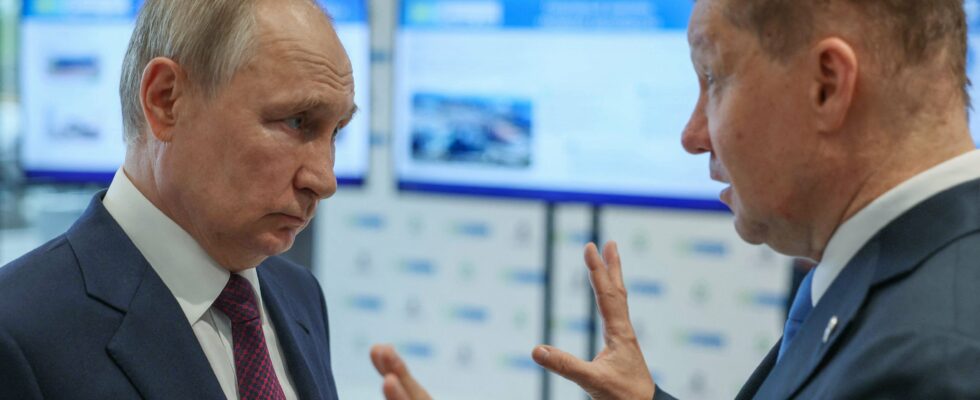In Russia too, the outcome of the war had a financial aspect. While Vladimir Putin has switched to a war economy with a surge in military spending, Gazprom’s concerns complicate the budgetary equation. Decryption with Agathe Demarais, specialist in geo-economics and researcher at the European Council on Foreign Relations.
L’Express: The information went relatively unnoticed but Gazprom is in bad shape, a direct consequence of Western retaliatory measures. Air gap or more structural crisis?
The Russian energy giant recently announced a loss of $6.8 billion for the whole of 2023, the first since 1999. Gazprom no longer has the capacity to sell its gas to Europe since Russia decided to turn off the tap, which pushed Europe, in reaction, to take the decision to completely deprive itself of Russian hydrocarbons by 2027.
To export its gas, the Kremlin can do so either through pipelines or in liquefied form, with LNG. The problem is that the current pipelines are directed to Europe and China is dragging its feet on concluding contracts with Russia. Regarding LNG, Western sanctions are hampering access to the technologies necessary for the development of the sector. Ultimately, Gazprom’s financial problems could further worsen.
While Gazprom’s revenues feed the Russian state’s coffers, what could be the consequences for Moscow?
In 2022, Gazprom paid a total of $40 billion to the Russian state, directly to the federal budget or via the Russian sovereign fund. This point is important because this sovereign fund today allows Russia to finance its budget deficit. For years, Gazprom has served as a cash cow, providing almost 10% on average of the country’s budget revenues. Since the start of the war, Moscow had also asked Gazprom for an exceptional contribution of $500 million per month. However, today, the group is no longer financially able to contribute to the sovereign fund and the federal budget, nor to pay this exceptional balance. Last week, the Kremlin even announced that Gazprom would not be able to pay dividends this year, which clearly shows how complicated the company is. This is obviously very important at a time when Russia’s military spending is soaring.
Could these difficulties have an impact on the financing and continuation of the war?
In the short term, Russia still has significant financial reserves. But the medium term is more complicated. The share of the sovereign fund’s liquid assets, that is to say those that Moscow can sell very easily, has already fallen by almost half – or around $60 billion – since the start of the war in 2022. Financing war is now fought in isolation. Until now, Gazprom contributed to the sovereign fund, which directly financed the Russian budget or recapitalized banks if they were in difficulty. Now, it is Russian public banks that must help Gazprom, which is no longer able to replenish the sovereign fund. How long can this system last? Finally, Gazprom’s problems do indeed complicate the financing of the Russian war effort.
A Russian law was recently passed relating to the seizure of American assets on Russian soil. Has a new stage been reached in this war of financial retaliation?
It is a law which is a continuation of all Russian decisions since the start of the war. For Moscow, it is a question of flexing its muscles at a time when discussions are resuming in the United States and Europe on the seizure of the assets of the Central Bank of Russia. Western companies that are still present in Russia have no illusions: they know that they have been in a very difficult situation for two years. In my opinion, this law does not change much since the Russian legal system is totally arbitrary anyway.
Should the West outbid and go further than what is currently being discussed within the G7?
What exactly are we talking about today? From the future about 300 billion dollars of reserves of the Central Bank of Russia. The transatlantic debates are very intense, with on one side American positions in favor of the pure and simple seizure of all frozen assets and on the other, a more moderate European position. France, Germany, Belgium, Luxembourg and Italy are not in favor of a total seizure of the assets of the Central Bank of Russia for fear of destabilizing the financial system. The real fear is that a number of countries, such as Saudi Arabia or Indonesia, will no longer invest their foreign exchange reserves in European assets. Hence the European proposal to use only part of the interest from frozen assets, that is to say a very small sum.
This agreement could be announced during the G7 which will be held in Italy from June 13 to 15. On this thorny subject, it is appropriate to go beyond the moral argument and question the side effects that a total seizure of Russian assets could have. Europe and all Western countries act as guardians of the norms of international law. This seizure would send a signal to the rest of the world that the West is ready to free itself from certain rules or to create new ones, depending on its current priority. In the long term, sending such a signal could prove detrimental.
.
